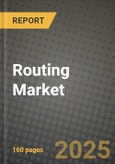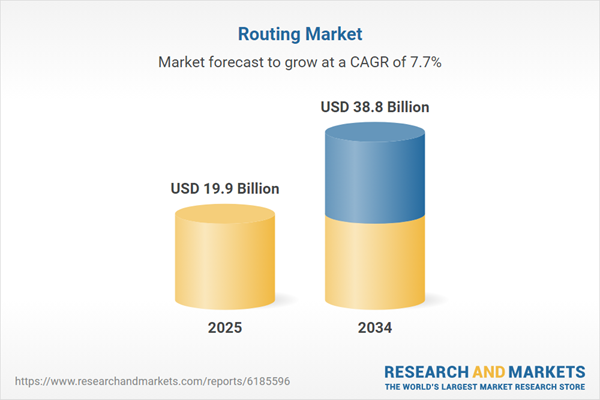The routing market plays a central role in enabling global digital connectivity, providing the critical infrastructure that directs data across local, wide-area, and cloud-based networks. Routers, the core components of this market, determine the optimal path for data packets, ensuring reliable and efficient communication between networks, devices, and data centers. The routing ecosystem spans a broad range of applications - from home Wi-Fi and small businesses to enterprise networks and telecom backbone systems. With the rapid expansion of cloud computing, 5G rollouts, IoT devices, and edge computing, routing technology is evolving to meet the demands of high-speed, low-latency, and highly secure communication. The market is increasingly shifting toward intelligent, software-defined, and virtualized routing platforms that can dynamically adapt to traffic loads, enhance user experience, and reduce operational complexity. As digital transformation accelerates, routing solutions are no longer just about connectivity - they are about performance, security, automation, and scalability.
The routing market experienced strong growth driven by increased investments in hybrid IT infrastructure, remote work connectivity, and cloud-native application deployment. Enterprises upgraded their legacy routers with AI-powered and SD-WAN-enabled devices to gain centralized control and real-time network visibility. Telecom providers expanded their routing infrastructure to support 5G backhaul, fiber broadband, and high-density urban networks. Vendors introduced compact and energy-efficient routers designed for edge computing environments and mobile deployments. Meanwhile, small and medium-sized businesses embraced cloud-managed routers for simplified network management and scalability. Security remained a key focus, with new routers offering embedded firewalls, encryption, and threat detection capabilities. Routing in data centers evolved toward disaggregated architectures, allowing more flexible and cost-effective scaling. These developments reflected a broader industry push toward smart, agile, and secure routing solutions that align with the complexities of modern digital ecosystems.
The routing market is expected to transition further toward software-defined and cloud-integrated solutions, as enterprises demand greater flexibility and operational efficiency. AI and machine learning will become integral to routing decision-making, enabling predictive traffic management and autonomous network optimization. The rollout of Wi-Fi 7 and continued 5G expansion will require next-generation routers with multi-gigabit capabilities, low latency, and higher port densities. Routing solutions will also be optimized for edge computing applications, supporting real-time analytics, industrial automation, and smart infrastructure. Emerging economies will contribute to market growth as they invest in broadband connectivity and digital infrastructure. Sustainability will emerge as a competitive differentiator, with energy-efficient and recyclable routers gaining preference among environmentally conscious enterprises. As the network edge becomes more dynamic and mission-critical, routing will evolve into a core enabler of resilient, intelligent, and future-ready digital operations worldwide.
Key Insights: Routing Market
- Adoption of SD-WAN and cloud-managed routing solutions is rising, providing enterprises with centralized control, simplified configuration, and agile scalability across distributed networks.
- Integration of AI and machine learning into routing platforms is enabling predictive traffic routing, anomaly detection, and self-healing network capabilities.
- Energy-efficient and compact routers are being developed to meet the needs of edge computing and sustainability-focused IT strategies.
- Routing solutions are increasingly embedded with cybersecurity features, including encryption, firewalls, and Zero Trust compliance mechanisms.
- Disaggregated and open-source routing architectures are gaining traction in data centers and telecom networks to reduce vendor lock-in and increase cost efficiency.
- Rising global internet usage and demand for high-bandwidth services are driving upgrades in core, edge, and consumer routing infrastructure.
- Digital transformation initiatives are prompting businesses to invest in intelligent routing systems that support cloud migration and hybrid work environments.
- Telecommunication providers are expanding 5G and fiber infrastructure, boosting demand for high-performance and scalable routing solutions.
- Increased reliance on IoT, remote operations, and edge computing is fueling the need for robust and secure routing at distributed endpoints.
- Managing the complexity of integrating new routing technologies with legacy systems and ensuring interoperability across multi-vendor environments poses a significant barrier to seamless network modernization.
Routing Market Segmentation
By Type
- Wired
- Wireless
By Placement
- Edge
- Core
- Virtual
By Application
- Datacenter
- Enterprise
By Vertical
- BFSI
- Healthcare
- Education
- Residential
- Media & Entertainment
Key Companies Analysed
- SMC Corporation
- Rockwell Automation Inc.
- Curtiss-Wright Corporation
- ABB Group
- Tolomatic Inc.
- Thomson Industries Inc.
- SKF Motion Technologies
- Moog Inc.
- MISUMI Group Inc.
- Macron Dynamics Inc.
- DVG Automation SpA
- Flowserve Corporation
- Festo AG & Co. KG
- Harmonic Drive LLC
- Cedrat Technologies
- Venture Mfg. Co.
- AUMA Riester GmbH & Co. KG
- Altra Industrial Motion Corp.
- Israel Aerospace Industries Ltd.
- AB SKF
- Nook Industries Inc.
- Rotomation Inc.
- Nook Industries Inc
- Kollmorgen Corporation
- Rotomation
- FMC Technologies
- Omron Adept Technologies
Routing Market Analytics
The report employs rigorous tools, including Porter’s Five Forces, value chain mapping, and scenario-based modeling, to assess supply-demand dynamics. Cross-sector influences from parent, derived, and substitute markets are evaluated to identify risks and opportunities. Trade and pricing analytics provide an up-to-date view of international flows, including leading exporters, importers, and regional price trends.Macroeconomic indicators, policy frameworks such as carbon pricing and energy security strategies, and evolving consumer behavior are considered in forecasting scenarios. Recent deal flows, partnerships, and technology innovations are incorporated to assess their impact on future market performance.
Routing Market Competitive Intelligence
The competitive landscape is mapped through proprietary frameworks, profiling leading companies with details on business models, product portfolios, financial performance, and strategic initiatives. Key developments such as mergers & acquisitions, technology collaborations, investment inflows, and regional expansions are analyzed for their competitive impact. The report also identifies emerging players and innovative startups contributing to market disruption.Regional insights highlight the most promising investment destinations, regulatory landscapes, and evolving partnerships across energy and industrial corridors.
Countries Covered
- North America - Routing market data and outlook to 2034
- United States
- Canada
- Mexico
- Europe - Routing market data and outlook to 2034
- Germany
- United Kingdom
- France
- Italy
- Spain
- BeNeLux
- Russia
- Sweden
- Asia-Pacific - Routing market data and outlook to 2034
- China
- Japan
- India
- South Korea
- Australia
- Indonesia
- Malaysia
- Vietnam
- Middle East and Africa - Routing market data and outlook to 2034
- Saudi Arabia
- South Africa
- Iran
- UAE
- Egypt
- South and Central America - Routing market data and outlook to 2034
- Brazil
- Argentina
- Chile
- Peru
Research Methodology
This study combines primary inputs from industry experts across the Routing value chain with secondary data from associations, government publications, trade databases, and company disclosures. Proprietary modeling techniques, including data triangulation, statistical correlation, and scenario planning, are applied to deliver reliable market sizing and forecasting.Key Questions Addressed
- What is the current and forecast market size of the Routing industry at global, regional, and country levels?
- Which types, applications, and technologies present the highest growth potential?
- How are supply chains adapting to geopolitical and economic shocks?
- What role do policy frameworks, trade flows, and sustainability targets play in shaping demand?
- Who are the leading players, and how are their strategies evolving in the face of global uncertainty?
- Which regional “hotspots” and customer segments will outpace the market, and what go-to-market and partnership models best support entry and expansion?
- Where are the most investable opportunities - across technology roadmaps, sustainability-linked innovation, and M&A - and what is the best segment to invest over the next 3-5 years?
Your Key Takeaways from the Routing Market Report
- Global Routing market size and growth projections (CAGR), 2024-2034
- Impact of Russia-Ukraine, Israel-Palestine, and Hamas conflicts on Routing trade, costs, and supply chains
- Routing market size, share, and outlook across 5 regions and 27 countries, 2023-2034
- Routing market size, CAGR, and market share of key products, applications, and end-user verticals, 2023-2034
- Short- and long-term Routing market trends, drivers, restraints, and opportunities
- Porter’s Five Forces analysis, technological developments, and Routing supply chain analysis
- Routing trade analysis, Routing market price analysis, and Routing supply/demand dynamics
- Profiles of 5 leading companies - overview, key strategies, financials, and products
- Latest Routing market news and developments
Additional Support
With the purchase of this report, you will receive:- An updated PDF report and an MS Excel data workbook containing all market tables and figures for easy analysis.
- 7-day post-sale analyst support for clarifications and in-scope supplementary data, ensuring the deliverable aligns precisely with your requirements.
- Complimentary report update to incorporate the latest available data and the impact of recent market developments.
This product will be delivered within 1-3 business days.
Table of Contents
Companies Mentioned
- SMC Corporation
- Rockwell Automation Inc.
- Curtiss-Wright Corporation
- ABB Group
- Tolomatic Inc.
- Thomson Industries Inc.
- SKF Motion Technologies
- Moog Inc.
- MISUMI Group Inc.
- Macron Dynamics Inc.
- DVG Automation SpA
- Flowserve Corporation
- Festo AG & Co. KG
- Harmonic Drive LLC
- Cedrat Technologies
- Venture Mfg. Co.
- AUMA Riester GmbH & Co. KG
- Altra Industrial Motion Corp.
- Israel Aerospace Industries Ltd.
- AB SKF
- Nook Industries Inc.
- Rotomation Inc.
- Nook Industries Inc.
- Kollmorgen Corporation
- Rotomation
- FMC Technologies
- Omron Adept Technologies
Table Information
| Report Attribute | Details |
|---|---|
| No. of Pages | 160 |
| Published | October 2025 |
| Forecast Period | 2025 - 2034 |
| Estimated Market Value ( USD | $ 19.9 Billion |
| Forecasted Market Value ( USD | $ 38.8 Billion |
| Compound Annual Growth Rate | 7.7% |
| Regions Covered | Global |
| No. of Companies Mentioned | 27 |









